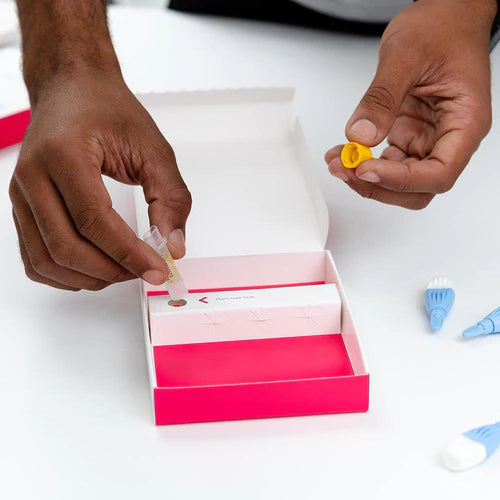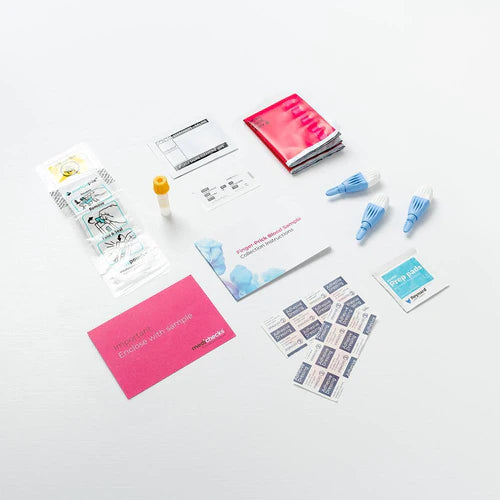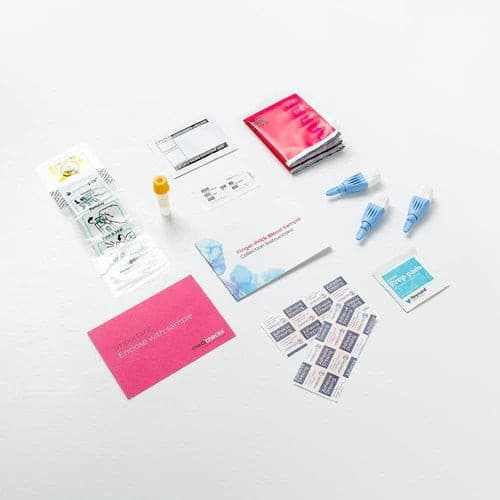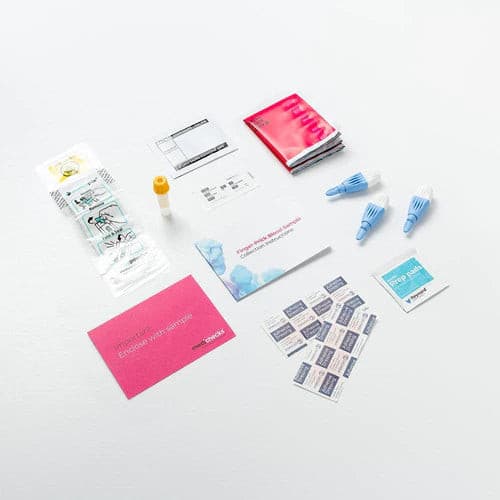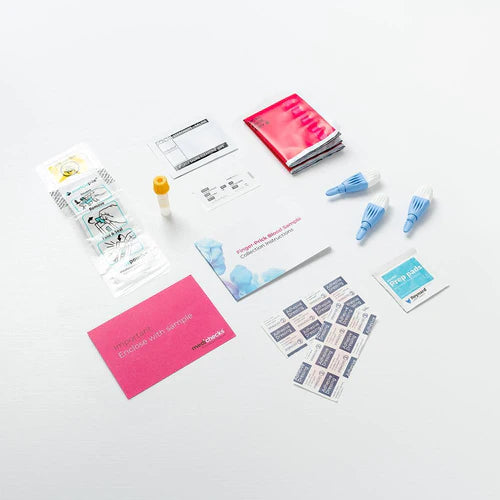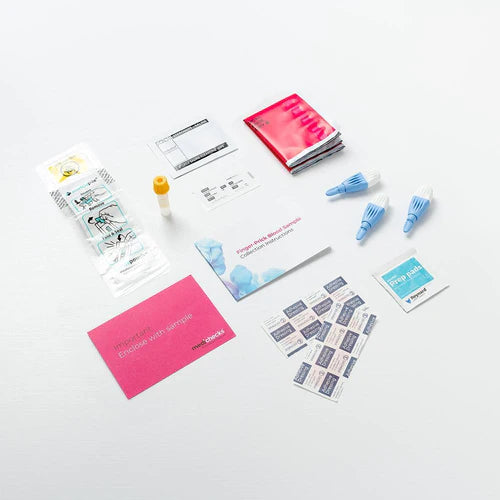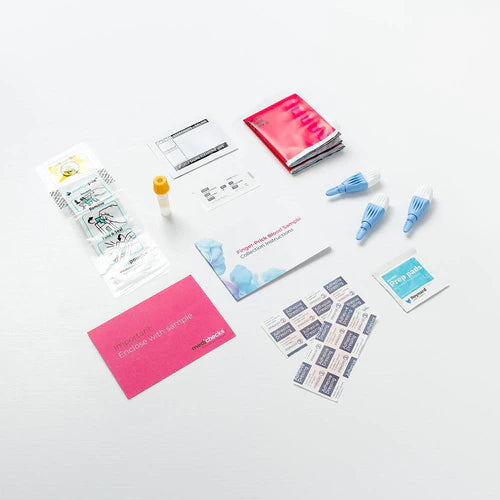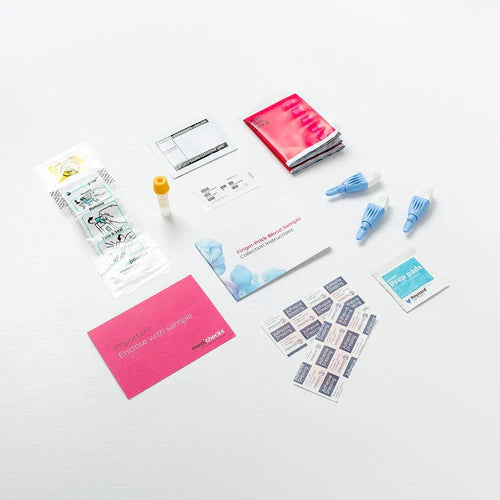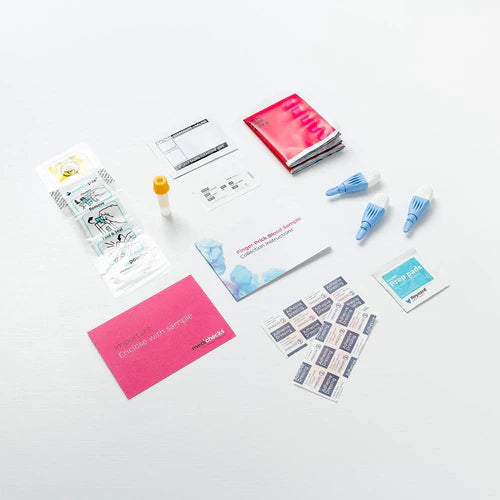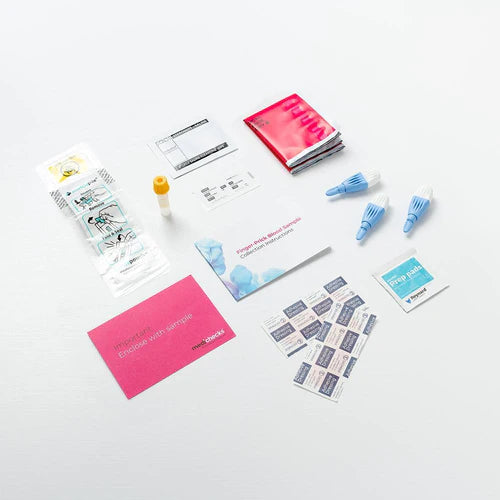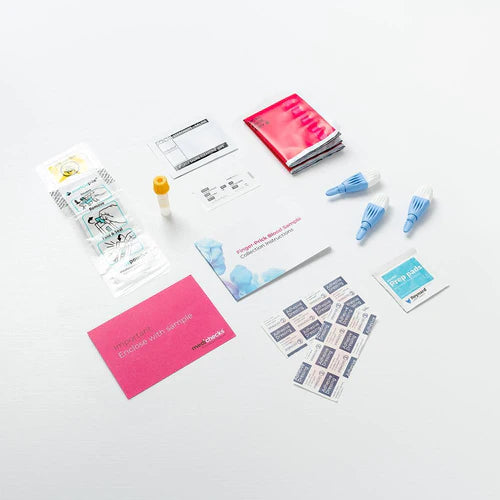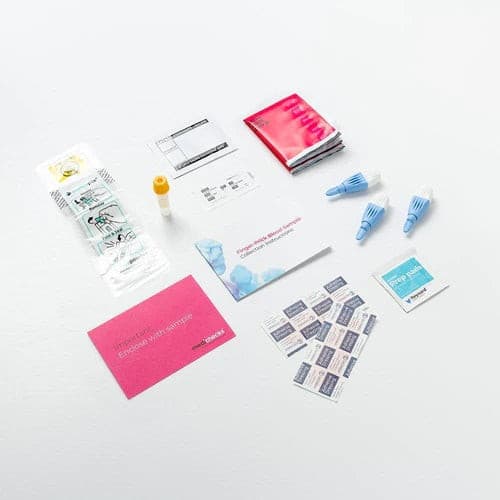Why People Choose Us

Quick & Easy
No appointment or long waiting times

Discreet Packaging
Plain packaging with no medical stamps or marks

Confidential Service
Your information stays with us and private payment

UK Medication
Dispensed by registered UK pharmacists
Inflammation (1 Biomarker)
When your immune system is triggered to purge your body of external invaders or irritants and to guard against tissue damage, inflammation results.
Inflammation frequently manifests as heat, redness, swelling, and discomfort. An acute or persistent inflammation might exist. Infection or injury are common causes of acute inflammation, which appears for a few days before going away.
Long-term diseases including arthritis, inflammatory bowel disease, or asthma can lead to chronic inflammation. Certain proteins that are elevated in the blood as a result of inflammation can be tested to determine the level of inflammation and, in some cases, its underlying cause.
CRP-HS
The C-Reactive Protein (CRP) is a marker of inflammation that is used to determine whether there is inflammation in the body but not where it is situated.
A test known as High Sensitivity CRP (CRP-hs) is used to find low-level inflammation that may harm blood vessels and cause a heart attack or stroke. There is a great deal of inflammation at the site of a significant injury. The swelling around a twisted ankle is easy to picture. Your CRP-hs will increase with any damage of this nature.
But frequent exercisers also run the danger of developing chronic low-level inflammation, which can harm their performance.
We draw this picture using CRP-hs, CK, and your complete blood count (see the articles on the liver and complete blood count). When you are rested for the test, inflammatory markers like CRP-hs provide the most insight; otherwise, they may be increased from recent exercise.
Cholesterol Status (10 Biomarkers)
A fatty molecule called cholesterol is present in the blood and is crucial for the proper functioning of the body's cells.
But having too much cholesterol in your blood can seriously harm your health since it makes you more likely to experience a heart attack or stroke.
Numerous variables increase the risk of cardiovascular disease, and we continue to learn more about the intricate biochemical mechanisms that trigger a heart attack.
However, even then, it is not so straightforward because there are various forms of cholesterol, some of which are more dangerous than others. High levels of cholesterol have long been recognised to increase your risk.
In addition to coming from the food we eat, cholesterol is also produced in the liver. Diet, family history, obesity, and inactivity all have a negative effect on cholesterol levels.
Total Cholesterol/HDL
By dividing your total cholesterol value by your HDL cholesterol level, you can get your cholesterol/HDL ratio.
It serves as a gauge of cardiovascular risk since it provides useful information about the percentage of "good" cholesterol in your total cholesterol (i.e. high-density lipoprotein, HDL).
The cholesterol/HDL ratio is used by heart disease risk calculators (like QRisk) to estimate your risk of suffering a heart attack.
Apolipoprotein A1
High-density lipoprotein, or HDL cholesterol, contains the protein apolipoprotein A1, or ApoA1. By eliminating cholesterol from tissues and organs that the liver will be destroying, it aids in the removal of cholesterol from the circulation.
Apolipoprotein B
The main apolipoprotein of low-density lipoproteins is apolipoprotein B, or ApoB. (LDL or bad cholesterol). It is in charge of delivering cholesterol to tissues.
LDL cholesterol
Low density lipoprotein, often known as LDL cholesterol, is a lipid and protein molecule that carries triglycerides, cholesterol, and other fats to various bodily regions
. When fatty deposits build up inside artery walls due to an excess of LDL cholesterol, sometimes known as "bad cholesterol," this could result in atherosclerosis and heart disease. Through food and exercise, your cholesterol levels can be dramatically reduced.
Likewise, if you can raise your levels, you may be able to avoid developing significant, potentially fatal illnesses in the future.
Results for HDL and LDL (and non-HDL) can be used as benchmarks and improvement targets. Regular exercise, especially cardio and weight training, will help lower LDL and raise HDL. Cholesterol levels will also be optimised by a Mediterranean diet that is heavy in vegetables and oily fish and low in meat and dairy.
Lipoprotein (a)
Triglycerides and cholesterol are carried in the blood by lipoproteins. Lp(a), also referred to as lipoprotein(a), is a risk factor for heart disease, particularly when LDL cholesterol is also elevated.
Lp(a) has the ability to hasten the development of artery-narrowing, artery-hardening plaques. The level of Lp(a) in a person's blood is genetically fixed and will largely stay constant throughout their lifetime.
Non-HDL cholesterol
All of the cholesterol molecules that are not HDL (or "good" cholesterol") are referred to as non-HDL cholesterol.
Therefore, it includes all of the potentially dangerous and non-protective cholesterol in your blood. As a result, it is thought to be a more accurate indicator of cardiovascular risk than LDL cholesterol and total cholesterol. Less than 4 mmol/L of non-HDL cholesterol is advised.
Through food and exercise, your cholesterol levels can be dramatically reduced. Likewise, if you can raise your levels, you may be able to avoid developing significant, potentially fatal illnesses in the future. Results for HDL and LDL (and non-HDL) can be used as benchmarks and improvement targets. Regular exercise, especially cardio and weight training, will help lower LDL and raise HDL.
Cholesterol levels will also be optimised by a Mediterranean diet that is heavy in vegetables and oily fish and low in meat and dairy.
Lp-PLA2
Lipoprotein-associated phospholipase A2 (Lp-PLA2) is an enzyme that contributes to blood vessel inflammation and the development of plaque in the coronary arteries. Since Lp-PLA2 is formed within the plaque itself, it is believed to be more sensitive than other standard inflammatory markers, such as CRP, in determining the risk of developing cardiovascular disease.
HDL cholesterol
High Density Lipoprotein, often known as HDL cholesterol, is a molecule that transfers cholesterol from the bloodstream to the liver, where it is broken down and expelled from the body as bile.
The term "good cholesterol" refers to HDL cholesterol. Through food and exercise, your cholesterol levels can be dramatically reduced. Likewise, if you can raise your levels, you may be able to avoid developing significant, potentially fatal illnesses in the future.
Results for HDL and LDL (and non-HDL) can be used as benchmarks and improvement targets. Regular exercise, especially cardio and weight training, will help lower LDL and raise HDL.
Cholesterol levels will also be optimised by a Mediterranean diet that is heavy in vegetables and oily fish and low in meat and dairy.
Total Cholesterol
In the organism, cholesterol is a necessary fat (lipid). Even though it has a terrible reputation, it performs a number of crucial tasks, such as creating cell membranes and a number of necessary hormones.
In addition to coming from the food we eat, cholesterol is also produced in the liver. The amount of both good (HDL) and bad (total) cholesterol in your blood is measured (LDL, VLDL and non HDL).
When carbohydrate energy sources are scarce or for endurance activities, fats serve as the main energy source. Medium-chain fatty acids in particular are used extensively.By examining the levels of the various forms of cholesterol, we can gain information into your health and cardiovascular risk.
Cholesterol distributes fatty acids throughout the body (i.e. the buildup of cholesterol in blood vessels leading to blood vessel narrowing, heart attack and stroke).
The liver controls the amount of cholesterol in the body; it produces and eliminates it, and it also produces different lipoproteins that carry cholesterol throughout the body. It is these that the cholesterol test measures.
Triglycerides
Triglycerides are a type of lipid that move through the bloodstream. They are transported in the bloodstream by chylomicrons and VLDLs, two types of lipoproteins (very low density lipoproteins).
Following a meal, extra calories are converted by your body into triglycerides, which are subsequently carried to cells where they are stored as fat. Triglycerides are then released by your body when it needs energy.
Easy Steps for your Medicine

Complete a consultation.
With complete privacy and confidentiality your form is checked by a pharmacist independent prescriber.
Choose your treatment.
From the list approved by the prescriber, choose your preferred treatment and then wait for it to be dispensed by UK Meds online pharmacy.
Receive your delivery
With next day delivery options available, you can have your treatment sent out to you discreetly within hours.Our Happy Customers
Rated Us for our Service Excellence
 Dispensed by Regulated UK Pharmacists
Dispensed by Regulated UK Pharmacists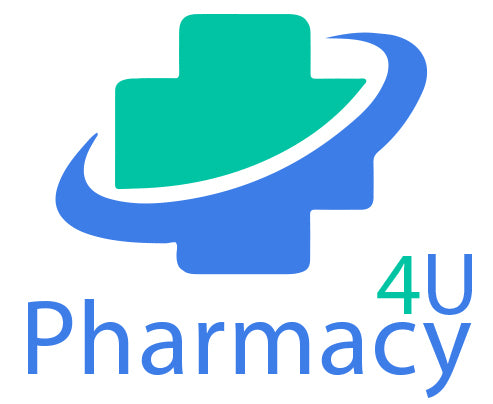

 How it works
How it works Help
Help Account
Account
 Basket
Basket










